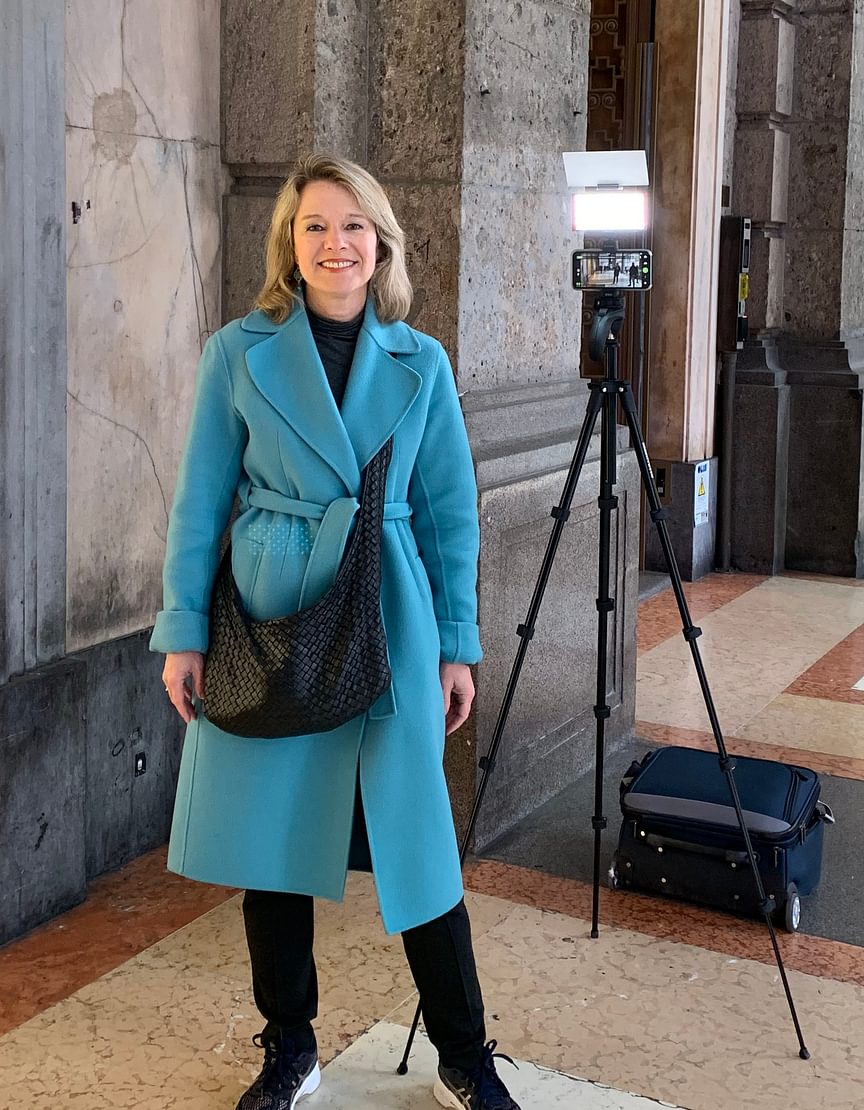
September 12, 2022
A complicated reality
Alumna Journalist Provides Russian View of War With Ukraineby Amy Kellogg ’83
In the circles of young, open-minded people I know in Moscow, there was a surprising bit of levity before the war with Ukraine began. Nobody thought it would actually happen. It sounded absurd. A war in Ukraine. Attacking your neighbor to improve your own national security. It just made no sense to many worldly Russians.
“If we are going to steal some land,” one joked, “why not take something like the Maldives? Not the Donbas.” But such humor, for the most part, quickly dried up when war began. And with a speed that struck me, many of those very same people who never thought an attack would occur were packing their bags, families, and dreams right up and leaving Russia. They fled to Turkey, Georgia, Azerbaijan, at least to weather the storm. Their numbers are not known. Some have apparently since returned. The term “brain drain” has been bandied about as another consequence of this war for Russia.
Thinking about it, the plans of those who fled must have been subconsciously or perhaps secretly coming together for some time as the screws tightened on freedom of speech year by recent year in Russia. People had been giving thought about where best to raise children. There is no place like home, but the first choice isn’t always the best choice, or so it began to seem.
From their place of exile, many Russians soon expressed a sense of horror, collective responsibility, and shame for what their country is doing to its brother. Some said they couldn’t think of anything else or manage to tear themselves away from the Telegram channels that are perhaps the most popular information medium right now for younger Russians. One told me in April that he hadn’t watched a movie or been able to enjoy a glass of wine since the war began.
The situation is debilitating and all-consuming for many Russians, even if they appreciate that their predicament doesn’t compare to that of the Ukrainians.
”Some Russians have started working at centers for Ukrainian refugees. Others are writing. Those anti-warriors who didn’t leave the country have invented ways to express protest, often standing alone with a sign somewhere. It is almost as if there is a competition to see whose message is most benign yet still manages to invite the ire of the police. A man in Moscow was arrested and fined for holding a sheet of white paper marked with asterisks equivalent to the number of letters it takes to spell “No War.” Even suggestive silence can be considered discreditation of the Russian army.
But those repressive methods seem to be working for the Kremlin or at least are not counterproductive to its aims. And the state TV propaganda machine fires on all cylinders. According to political scientist Ekaterina Schulmann, herself now in exile, while the polls are not a perfect representation of society but rather a reflection of those who agree to answer questions, they indicate that support for President Vladimir Putin remains solid. The Levada Center, perhaps the most reliable pollster, in June found 72 percent of Russians would like to see him stay in office after 2024, when the next elections are scheduled. Its polls indicate the majority of Russians blame NATO, and more specifically the United States, for the death and destruction in Ukraine. In a recent conversation, Schulmann told me this seems a fairly reasonable emotional response to a nightmarish reality. Looking for an explanation that will let you continue to live somewhat comfortably in your own world makes certain sense. But she worries that messaging from the outside world ends up sounding to many Russians like the West is out to get them. It’s a line the Kremlin launched and has used effectively.
This all bodes a long period of isolation for Russia that will likely see the state further consolidate power and enterprise. The government-run economy of the Soviet era ultimately buckled from inefficiency and debt. How Russia, now reveling in what it spins as a path toward independence from the outside world, will truly fare if this war grinds on is anybody’s guess.
__________________
Amy Kellogg ’83 @amykelloggfox serves as senior foreign affairs correspondent for Fox News and is based in Milan, Italy. She has lived and worked in Moscow and London during her time at the network and has covered stories from Europe to the Middle East. Kellogg is also the author of Cuore Rosso a thriller and love story set in Russia and published in Italian in 2021.





